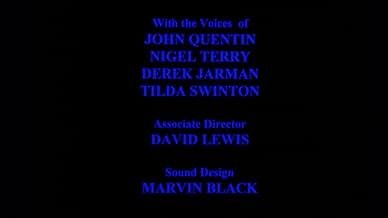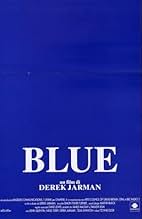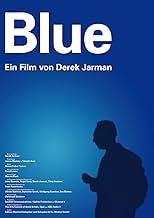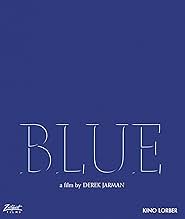CALIFICACIÓN DE IMDb
7.3/10
3.1 k
TU CALIFICACIÓN
Contra una pantalla azul simple e inmutable, una banda sonora densamente entretejida de voces, efectos de sonido y música intenta transmitir un retrato de las experiencias de Derek Jarman co... Leer todoContra una pantalla azul simple e inmutable, una banda sonora densamente entretejida de voces, efectos de sonido y música intenta transmitir un retrato de las experiencias de Derek Jarman con el SIDA.Contra una pantalla azul simple e inmutable, una banda sonora densamente entretejida de voces, efectos de sonido y música intenta transmitir un retrato de las experiencias de Derek Jarman con el SIDA.
- Dirección
- Guionista
- Elenco
- Premios
- 2 premios ganados y 1 nominación en total
- Dirección
- Guionista
- Todo el elenco y el equipo
- Producción, taquilla y más en IMDbPro
Opiniones destacadas
There is nothing I can write here that hasn't been written before about this film. A masterpiece. A seemingly 'dull' film. A brave and courageous final farewell from a great man.
Art for Arts Sake? Ars Gratia Artis? No. Absolutely not. This is a film made by a dying man while practically on his deathbed. His sight robbed of him, what more could an experimental film-maker do?
A powerful script telling of his life ('I'm sitting in a cafe....'), the things around him (the cyclist who nearly knocks him over to then hurl abuse at him), his lifestyle (I am a cock sucking straight acting lesbian man, I am a not-gay).
Jarman's Voice Over is the most provocative text about one's own death I know of. Of course, he knew he was dying. His doctors told him he was dying. He goes into graphic details of his medications, his symptoms, his pains. Never again can a film maker describe their own death in such a way, Jarman has done it and done it brilliantly.
The Blueness also plays a part. After a few minutes I felt angry, annoyed at having to stare at a screen of blue. I tried looking at the floor, closing my eyes, anything to avoid the blue. But I kept looking back.
A Masterpiece. Simple as that.
Art for Arts Sake? Ars Gratia Artis? No. Absolutely not. This is a film made by a dying man while practically on his deathbed. His sight robbed of him, what more could an experimental film-maker do?
A powerful script telling of his life ('I'm sitting in a cafe....'), the things around him (the cyclist who nearly knocks him over to then hurl abuse at him), his lifestyle (I am a cock sucking straight acting lesbian man, I am a not-gay).
Jarman's Voice Over is the most provocative text about one's own death I know of. Of course, he knew he was dying. His doctors told him he was dying. He goes into graphic details of his medications, his symptoms, his pains. Never again can a film maker describe their own death in such a way, Jarman has done it and done it brilliantly.
The Blueness also plays a part. After a few minutes I felt angry, annoyed at having to stare at a screen of blue. I tried looking at the floor, closing my eyes, anything to avoid the blue. But I kept looking back.
A Masterpiece. Simple as that.
Derek Jarman's final work is perhaps his most unusual. The visuals are nothing but a solid screen of bright blue. The soundtrack is a montage of sound effects, voice overs, and music. The dialogue is Derek Jarman's coming to terms with himself, and his terminal illness.
Some will find the whole affair a pretentious bore. Others will find it a moving farewell from a groundbreaking British film-maker who was completely blind by the time the film was completed. He broke the rules, especially with this film, and it's probably how he wanted to be remembered.
Some will find the whole affair a pretentious bore. Others will find it a moving farewell from a groundbreaking British film-maker who was completely blind by the time the film was completed. He broke the rules, especially with this film, and it's probably how he wanted to be remembered.
Jarman's "Blue," a feature consisting entirely of a blue screen with voice-overs, has succeeded in annoying viewers with its seemingly uninventive approach to the cinematic personal narative. As so much of what we have come to consider "good" filmaking relies primarily on our sense of sight and our ability to absorb and process hundreds of CGI critters flashing before our eyes, it is easy to forget that a "good film" relies as much if not more so on the story than it does on the visuals.
Jarman's story is one that does not need visuals to support it. Reflecting upon his life in the face of his rapidly approaching death, Jarman's memories and meditations offer the viewer (listener, really) a window into the soul of a director who is losing the most important sense he could posses: his sight. Blue was the last color available to him before AIDS related complications robbed him of his sight. As he stands before death and stares it straight in the face, Jarman's writings put forth a suprising feeling of calmness, as he has accepted his own finitude and shares his meditations with us in this, his last masterpiece.
Jarman's story is one that does not need visuals to support it. Reflecting upon his life in the face of his rapidly approaching death, Jarman's memories and meditations offer the viewer (listener, really) a window into the soul of a director who is losing the most important sense he could posses: his sight. Blue was the last color available to him before AIDS related complications robbed him of his sight. As he stands before death and stares it straight in the face, Jarman's writings put forth a suprising feeling of calmness, as he has accepted his own finitude and shares his meditations with us in this, his last masterpiece.
Many people complained about the triteness or cliche nature of the device of using an all-blue screen for the seventy-some odd minutes of this film. I'd guess that most of these people never saw the film on the big screen.
If you did see this on a big screen, however, you were sure to notice the tricks your eyes played on you. Jarman, directing this film as he lost his eyesight (and what could be worse for a director?), last saw the color blue. As you watch the film, your eyes become saturated with the color blue, and begin to try and compensate for the overstimulation, shifting to oranges, showing illusionary shapes in the blank field of the screen, and ultimately betraying you. What better allegory for the loss of one's vision, especially when it means everything to you?
If you did see this on a big screen, however, you were sure to notice the tricks your eyes played on you. Jarman, directing this film as he lost his eyesight (and what could be worse for a director?), last saw the color blue. As you watch the film, your eyes become saturated with the color blue, and begin to try and compensate for the overstimulation, shifting to oranges, showing illusionary shapes in the blank field of the screen, and ultimately betraying you. What better allegory for the loss of one's vision, especially when it means everything to you?
Not sure I could have made much of it without knowing at least a little backstory, and even then, it was somewhat hard to get a handle on at times. It is just 75 minutes of a blue screen, but the audio is surprisingly engaging, and there is some narrative to be found within it.
There's a good deal of spoken word, often poetic, and sometimes quite moving. Some of the snippets of music used here are also fantastic- not sure if they were sampled and if so where from, but they added a lot.
Despite the short length, had put off watching this for a while because I wasn't sure I was ever in the right mood for something this different and challenging. Even tonight, it wasn't the perfect movie for this very day, but at least now I'll know what to expect, and can maybe return to it on a day when I'm feeling like I could connect to it more.
But for the parts that did get to me, and the fact that it was an experiment that was mostly pulled off very well, a good deal of credit must be given.
There's a good deal of spoken word, often poetic, and sometimes quite moving. Some of the snippets of music used here are also fantastic- not sure if they were sampled and if so where from, but they added a lot.
Despite the short length, had put off watching this for a while because I wasn't sure I was ever in the right mood for something this different and challenging. Even tonight, it wasn't the perfect movie for this very day, but at least now I'll know what to expect, and can maybe return to it on a day when I'm feeling like I could connect to it more.
But for the parts that did get to me, and the fact that it was an experiment that was mostly pulled off very well, a good deal of credit must be given.
¿Sabías que…?
- TriviaDerek Jarman went completely blind as a side effect of AIDS which is why this film is audio based. He died the year after its production.
- Citas
Terry, Nigel: We've always been mistreated and the moment anyone gives us the slightest bit of attention we over-react with our thanks.
- ConexionesFeatured in Derek Jarman: Life as Art (2004)
Selecciones populares
Inicia sesión para calificar y agrega a la lista de videos para obtener recomendaciones personalizadas
- How long is Blue?Con tecnología de Alexa
Detalles
Taquilla
- Presupuesto
- GBP 90,000 (estimado)
- Tiempo de ejecución
- 1h 19min(79 min)
- Mezcla de sonido
- Relación de aspecto
- 1.85 : 1
Contribuir a esta página
Sugiere una edición o agrega el contenido que falta


























